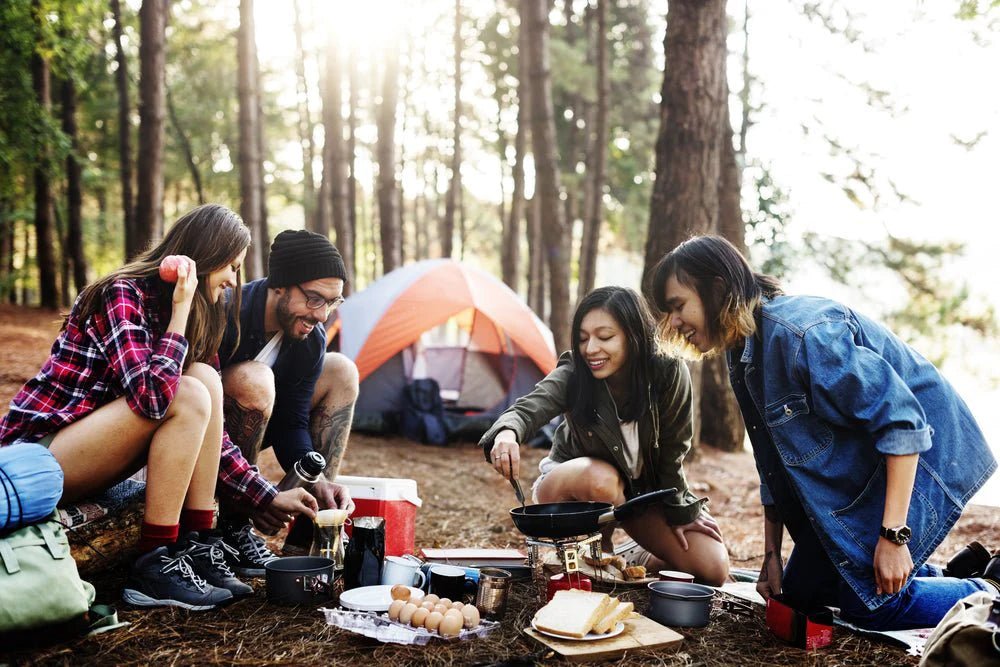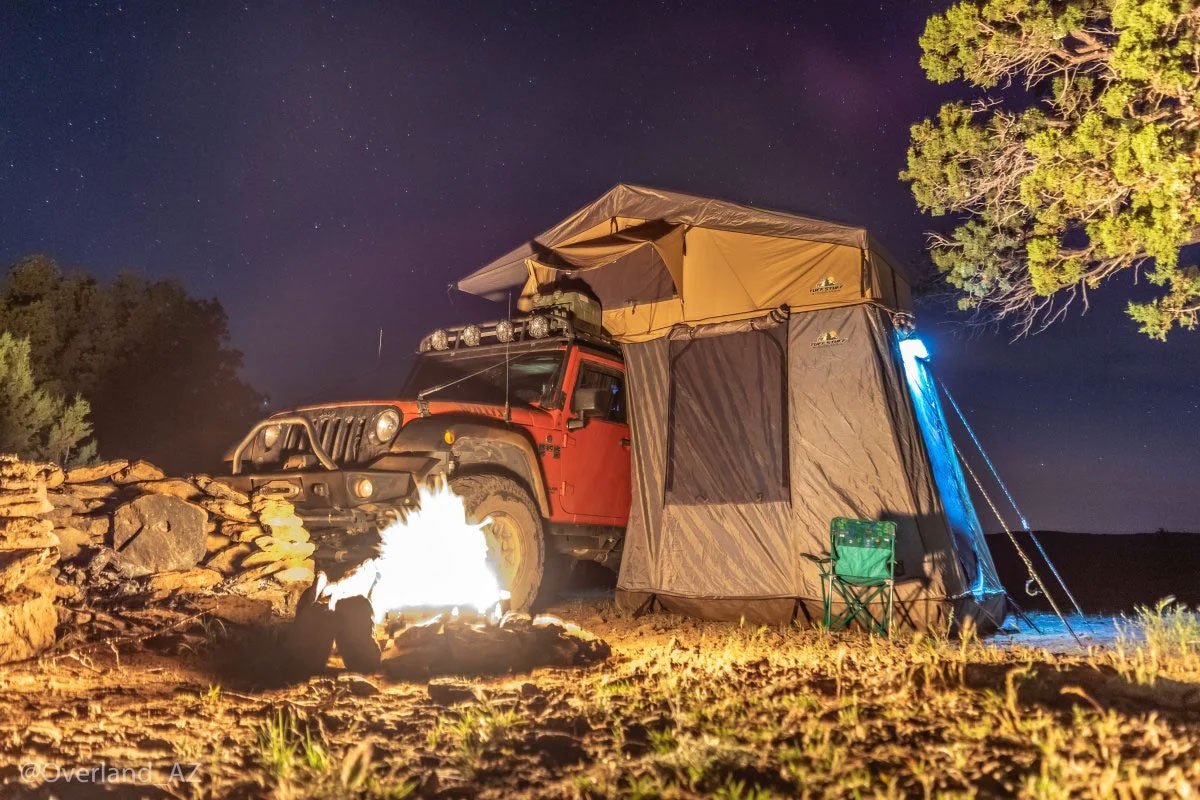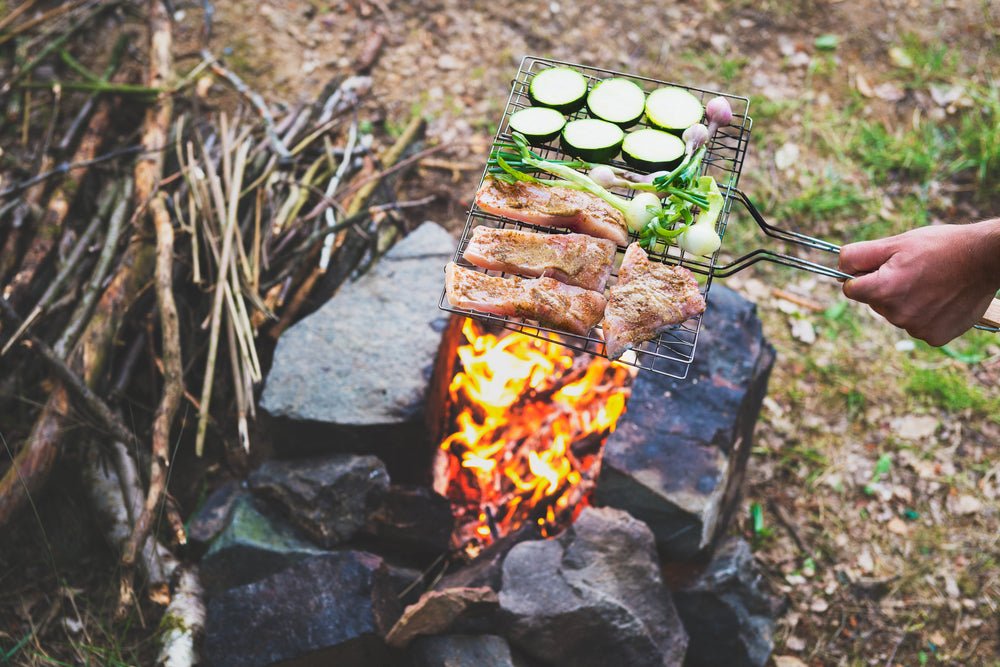Camping out in the wild means one thing- you are far away from any source of electricity. This limits your ability to charge your devices and completely eradicates equipment like microwaves, rice cookers, and your trusty fridge.
While there are other means of transporting raw food on your camping trips, like using coolers, this means a heavier load and one more piece of equipment to take care of. So what alternative do you have?
Cooking during your camping expenditure doesn't always require refrigeration. As proof, we have provided 30 deliciously easy camping foods you can enjoy without refrigeration.

Camping Food Without Refrigeration
Most campers will agree that a cooler is one of the essential camping equipment they bring along on every trip. This portable fridge is perfect for storing drinks and perishable food items to enjoy at your campsite.
However, it is essential to note that coolers are not exactly nifty. Bringing a cooler box with you as a part of your overland gear or camping equipment means you have one more bulky piece of equipment to hoist and haul around.
Even if you are lucky enough to own an RV refrigerator, there is just so much you can fit in your little fridge. If you find either option challenging, we have just the perfect solution for you!
While it still makes sense to bring a cooler on your subsequent camping expenditure if you like, you should note that it shouldn't be a priority. Understandably, you need an option to store all your perishable ingredients and keep them fresh, but have you ever considered other convenient options like not bringing ingredients that need refrigeration?
Before you fret, we are not saying you should toss out your dreams of eating delicious meals while camping and sticking to cinnamon rolls on a stick. We are saying that there are tons of food options that do not need refrigerators to explore.
With these foods, you don’t have to worry about topping the ice in your coolers. It doesn't matter if you are camping in the peak of summer or exploring the outdoors in the cold, you can enjoy these meals without lugging a cooler around with you.
It also doesn’t matter if you are a picky eater, vegan, or lover of hearty meals, these foods are the perfect option for you.
1. Bagel
This doughnut-shaded goodness is the perfect non-refrigerated breakfast food you can ask for. It is fast, easy to prepare, and highly delicious. As a plus, you can enjoy it however you want abs with whatever topping or drizzle.
Simply butter up your bagels and toast them on both sides in a camping frying pan or girdle. You can enjoy your bagel plain or add a few slices of fresh vegetables like tomatoes and onions. If you feel adventurous, pair your babes with peanut butter or Nutella.
2. Butter
Butter is essential for many camping meals. If you need to grease up your pan to create a savory dish or simply prepare a meal that requires oil to cook, a slab of butter always comes to the rescue.
While many campers often keep their butter in a cooler, it isn't always necessary. Butter performs just as well without a refrigerator. You can store your butter in a Ziploc bag and toss it in Tupperware and pack it with other dry foods. You can also wrap your butter on parchment paper.
3. Popcorn
Popcorn is the perfect camping snack for kids and adults alike. Most importantly, it doesn't need to be stored in a refrigerator! Your popcorn kernels can be stored in a tightly sealed jar and kept in a cool, dry place.
This will help it last longer and stay fresh. Your popcorn can be popped over the campfire and enjoyed with melted chocolate, caramel, cinnamon, and any dressing you like.
4. Meat
Just because you don't have a cooler or refrigerator doesn't mean you have to kick meat out of your camping diet totally. The solution is to bring meat that does not need refrigeration.
Some long-lasting canned meat products fare well in cool and dry places. Canned chicken, chicken packets, sausage links, precooked bacon, beef jerky, and canned ham are viable protein substitutes.
It is important to note that while they may not require registration, they need to be consumed quickly after opening or refrigerated as soon as possible.
5. Eggs

Eggs are a significant part of camping meals. From scrambled eggs to being a sandwich assemblage, eggs are versatile and make every dish they are paired with taste better.
While we traditionally keep eggs in a fridge, it is important to note that eggs can be kept outside a fridge. While this is great, as eggs are very fragile, you should transport them carefully in a plastic storage box.
When shopping for camping eggs, opt for fresh eggs that have never been in a fridge. You can also add powdered eggs to your list as a substitute.
6. Cheese
Cheese is a staple in many camping meals. They taste fantastic when eaten alone or paired with burgers and many other foods.
Cheese can survive outside a refrigerator without difficulty. All you need to do is ensure you don't leave your cheese sitting in the sun, as this will reduce it to a gooey mess. You can wrap the blocks of cheese in cellophane, seal them in a small bag, and keep them in a cool place.
7. Instant Foods
Instant foods on a camping trip are lifesavers. They are delicious, convenient, and do not need to be stored in a refrigerator.
Instant noodles, instant rice, and instant potatoes are tasty and filling food options. They are lightweight, do not take up excess space, and are easy to make.
8. Grains
Grains are great camping foods - especially for backpackers- as they do not require refrigeration. Most grains are easy to cook and can be used to create hearty and filling meals.
From pasta to rice, couscous, and Quinoa, grains are a must-have on any camping trip.
9. Bread
Bread is a great food option for backpacking or regular company. However, it is essential to note that they can be bulky and get squished during transit.
While your loaf getting squished doesn't ruin its taste, it might ruin your plans to make toast or sandwiches. If this doesn't bother you, then pack a tasty loaf of bread to the camp. If the bread was hot before your trip, air it to lengthen its shelf life.
If you, however, want tasty flour bread substitutes to enjoy during your trip, we recommend dinner rolls, pita bread, and Sandwich rounds.
10. Fruits
Fruits provide dietary fiber and are a great way to stay healthy during your adventures.
At home, fresh fruits are primarily kept in the fridge to extend their shelf life. However, just because you choose to keep fruits in the fridge doesn't mean they won't survive outside one.
Fresh apples, oranges, kiwi, mangoes, watermelon, pineapple, and even avocado can be enjoyed without a fridge. Just ensure you finish eating them after slicing them up as soon as possible. This will help you keep bugs away. You can also opt for dry/dehydrated fruits or canned varieties.
11. Vegetables
Just like fruits, veggies can be enjoyed without a fridge. You simply have to store them in paper bags to lengthen their shelf life and slow the ripening processes.
Use air-tight containers to store your vegetables unless it requires aeration. Substitute cabbage for lettuce as they last longer. If you don't want to pack fresh vegetables, you can choose canned vegetables instead.
12. Milk
Just because you don't have a fridge in the wilderness doesn't mean you shouldn't pack milk. There are other varieties of fresh milk that you can enjoy on your camping trip.
Powdered milk is a prevalent option. All you need to do is add water, and you are going to be rewarded with a cup of hot or cold milk, depending on how you like it. You can also choose cans of evaporated milk, creamer packets, or cartons of soy milk.
13. Dried Lentils
Dried lentils do great outside a refrigerator. They can remain fresh for a long time if you keep them sealed and tucked away from moisture and heat. Lentils can be stored in thick mylar bags and food-grade pales.
14. Fish Substitutes
Tuna is a great fish substitute that doesn't require refrigeration until after opening. It works well as a salad or coupled with other dishes. You can also choose canned salmon.
15. Breakfast Cereals
Everyone loves cereal. They are especially great for camping trips because they are dry foods which makes them easy to move and store.
When going camping, simply pack your favorite brand of favorite cereal. You can enjoy it with powdered milk and a little sugar if necessary.
16. Muffins
Muffins come in different shapes, sizes, and flavors. They are tasty, convenient, lightweight, and easy to prepare.
You can make your muffins at home and store them in air-tight containers to bring to the campsite.
17. Tortillas
Tortillas are excellent camping food options. They are rich in calories, require little to no prep, and can last more than a week without a refrigerator. They are easily customizable, so you can fill your tortillas with whatever filling you want and enjoy a delicious meal.
18. S’mores

Every camper will agree that s’mores are a camping classic. They are fun, tasty, and can be quickly prepared. Smores can be prepared over a campfire or a grill.
19. Oatmeal
Oatmeal makes an easy campsite breakfast. It is easy to store and can be enjoyed in various ways by adding your favorite nuts, berries, and fruits.
While traditionally, many people cook oats over a campfire or on coals, there is a heatless and equally delicious way to prepare your oatmeal. Simply soak it overnight and stir in your favorite seeds and nuts.
20. Honey
It is no surprise that honey makes our list of campfire foods that do not require refrigeration. Honey is the world’s oldest food and can go months without getting spoilt.
Honey is a natural food with profound health benefits that range from gastrointestinal to cardiovascular advantages. It is the perfect sweetener addition to tea or coffee. It can also be drizzled over bread, potatoes, or even oatmeal.
To store your honey, leave it tightly sealed in its bottle and keep it in a cool place away from sunlight.
21. Chips, Pretzels, And Crackers
Chips, pretzels, and crackers are light snacks that you can enjoy in various ways. They are perfect for large groups and family camping expenditures.
Chips, pretzels, and crackers are dry snacks and do not require refrigeration. They are easy to move and can be stored in storage boxes.
22. Seeds
Sunflower seeds, chia seeds, pumpkin seeds, and pine nuts are packed with flavor, nutrients, and essential minerals. They can be eaten as they are or paired with foods like oatmeal.
Seeds are easy to store and last a while. Since humidity and warmth shorten a seed’s shelf life, it is important to store your seeds in an airtight container in a cool, dark, and dry place.
23. Granola Bars
Do you need an emergency snack? Granola bars are the perfect fix for you. Packed full of oat, nuts, seeds, dried fruits, and chocolate, granola bars are the perfect energy source. They do not need to be refrigerated, and you can fit multiple bars in your fanny pack or wallet
24. Canned Beans
Canned beans have a long shelf life, even outside a refrigerator. As long as you consume your beans as soon as you open the can, you will enjoy fresh food.
Canned beans can be paired with other foods that do not need refrigeration, like rice and bread.
25. Trail Mix
A trail mix is a perfect camping/hiking snack. It consists of dried fruit, nuts, and sometimes candy. A typical trail mix is nutritious, easy to carry, and even easier to store.
Because a trail mix is made mainly of nuts and fruit, you can customize it however you want. To store your trail mix, simply keep it in a tight container away from direct sunlight.
26. Seaweed
Who says you can't bring seaweed wraps on your camping trip? No one! Seaweed is perfect for outdoor life because it doesn't require much effort for storage. They will survive the heat of the sun and remain tasty.
Seaweed wraps can be used to eat dishes like rice and canned salmon. Think of it as a tortilla wrap substitute.
27. Canned Hummus
Why make hummus from scratch when you can easily get one in a can? Hummus is a healthy food that can be paired with tortilla chips, pita, crackers, carrot sticks, and even sandwiches.
Thanks to its packaging, canned hummus doesn't have to be kept in a refrigerator until you open the can. As long as you consume the hummus immediately after opening the can, you will get nothing but fresh food.
28. Canned Soup
Just because you don't have a fridge doesn't mean you cannot enjoy delicious soup. While fresh soup is excellent, canned soup is just as tasty and filling.
Plus, they are easy to store. As long as you keep your canned soup away from heat and light, you do not have to worry about not having a fridge until you open the can. Simply heat your soup and serve it out alone or with any dish.
29. Nuts
Nuts are a source of numerous health benefits, from providing essential high-quality vegetable protein to reducing your cholesterol level. From peanuts to cashew nuts and almond nuts, there are just so many dishes you can enjoy with nuts. They are easy to store and can last you a while.
30. Cheese Whiz
If you need a cheese substitute that is not actually cheese but tastes a lot like cheese, Cheese Whiz is your go-to option. This brand of processed cheese sauce can be enjoyed with burgers, nachos, tortillas, and even pasta. Not to mention, it is also a non-refrigerated food option.
As a bonus, here's a meal plan of non-refrigerated foods you can try during your subsequent expenditure!

Non-refrigerated Camping Breakfast
- Oatmeal and powdered milk with fruits
- Cereal
- Sliced fruits. Can be grilled
- Pancakes, honey, and fruits
- Omelettes made from powdered eggs, bacon, and veggies
- Instant potatoes with veggies
- Toast
- Muffins
- Fruit and Grain bars
- Scrambled eggs
Non-refrigerated Camping Lunch
- Rice and beans
- Peanut butter and jelly sandwiches
- Mac and cheese
- Avocado toast
- Bagel
- Grilled Cheese
- Potato with bacon and vegetables
- Tuna packets, crackers, and veggies
- Avocado boats
- Banana boats
Non-refrigerated Camping Dinner Ideas
- Baked potatoes
- Canned chili and potatoes
- Canned soup
- Baked beans
- Instant noodles
- Canned chicken
- Ramen
- Pasta and sauce
- Customized charcuterie board
- Black beans, Quinoa, and rice
Tips To Keep Your Non-Refrigerated Food Fresh
Although these foods can survive without a refrigerator, it is essential to take proper measures to ensure they remain fresh. Some of these measures include:
- Keep your food in the shade. Most food will not survive exposure to direct sunlight, so it is vital to ensure they get all the cover they need.
- Don’t just abandon the food. Check on them regularly.
- When shopping for your non-refrigerated food inventory, always opt for non-refrigerated foods.
- While many of these non-refrigerated foods don't need a fridge, keep in mind that when you open their packages, you will need a fridge for storage. To avoid wastage, plan your meals, buy smaller packages, and finish the food as soon as you open the package.
No Fridge? No Problem
While you might be tempted to bring a cooler along on your subsequent expenditure, understand there are delicious alternative meals that don't need refrigeration. We have provided 30 foods you can pack, but there are undoubtedly more foods out there that don't need refrigeration.
Remember to store your foods properly. This will help you enjoy deliciously fresh foods for longer.
Are you looking for more camping advice? Check out our tips on the overland gear and equipment basics for your subsequent expenditure.



